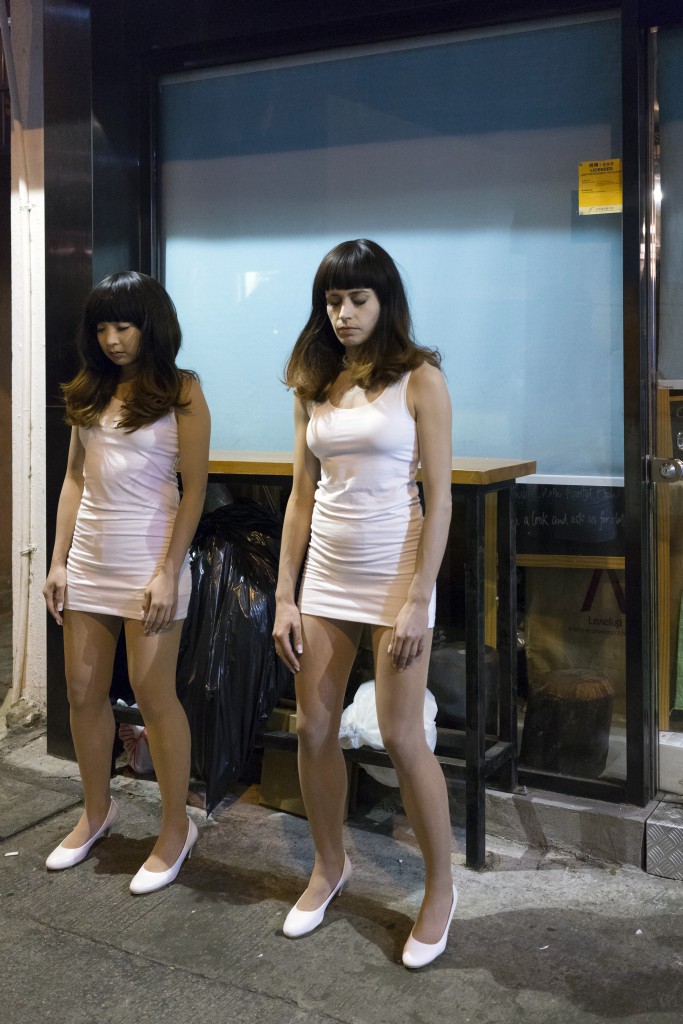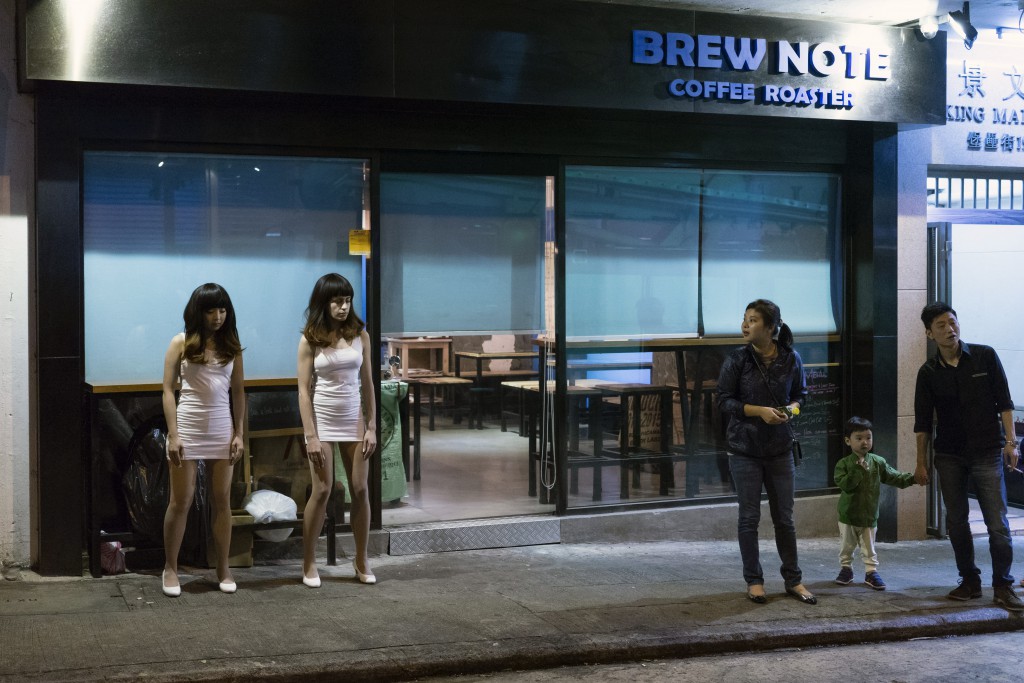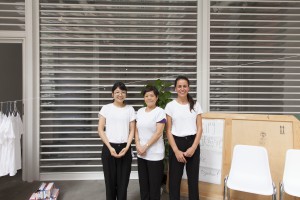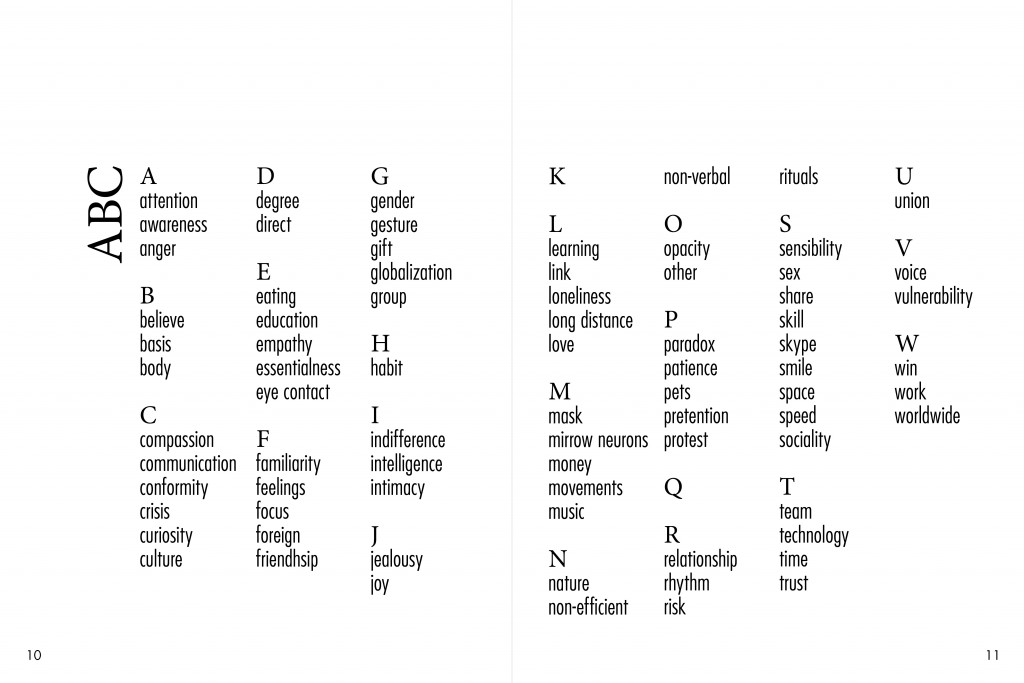STANDING LIKE A POST
Performance on Friday 20/11/2016 in front of Connecting space, North point, HK


connecting spaces hong kong
ABOUT PRACTICE 1: UNIFORMITY
Learning Tai Chi
Fire Dragon Dance, Midautum Festival, Hongkong, September 2015
List of uniforms passing within 1 hour in front of Connecting space:
schoolkids
delivery service
policemen
scouts
Kung-Fu-students
truck driver (naked upper bodies)
clerks or bankers
princesses
sport/training
cooker
cleaning personal
nurse
car mechanic
military officer
post clerk
security staff
BECOMING BEAUTIFUL
(Inspirations for the performance Standing like a post)
INTEGRATE /ˈɪn.tɪ.ɡreɪt/ (verb)
1) to mix with and join society or a group of people, often changing to suit their way of life, habits, and customs:
-He seems to find it difficult to integrate socially.
-It’s very difficult to integrate yourself into a society whose culture is so different from your own.
-Children are often very good at integrating into a new culture.
2) to combine two or more things in order to become more effective:
-You need to integrate exercise into your normal life.
-The idea with young children is to integrate learning with play.
Source: Cambridge dictionaries online
Wu wei (無爲), literally „non-action“ or „not acting“, is a central concept of the Tao Te Ching. The concept of wu wei is multifaceted, and reflected in the words‘ multiple meanings, even in English translation; it can mean „not doing anything“, „not forcing“, „not acting“ in the theatrical sense, „creating nothingness“, „acting spontaneously“, and „flowing with the moment.“
UNIFORM (uni|form /ˈjuːnɪfɔːm/)
A) UNIFORM (adjective)
1) Remaining the same in all cases and at all times; unchanging in form or character
2) Denoting a garment forming part of a person’s uniform:
B) UNIFORM (noun)
1) The distinctive clothing worn by members of the same organization or body or by children attending certain schools
Source: Cambridge dictionaries online
Learning the 24-T’ai chi-Form
The 24-form or Beijing-Form was the result of an effort by the Chinese Sports Committee, which, in 1956, brought together four t’ai chi teachers – Chu Guiting, Cai Longyun, Fu Zhongwen, and Zhang Yu – to create a simplified form of t’ai chi as exercise for the masses. The creators truncated the traditional family style t’ai chi forms to 24 postures; taking about six minutes to perform and to give the beginner an introduction to the essential elements of t’ai chi ch’uan, yet retain the traditional flavor of traditional longer hand forms (in general, 88-108 postures). Henceforth, this form was avidly promoted by the People’s Republic of China for general exercise, and was also taught to internees in Communist “re-education” camps. Due to this official promotion, the 24-form is most likely the t’ai chi-form with the most practitioners in China and the world over (though no surveys have been performed).
Source: Wikipedia
LET’S TAKE A PICTURE TOGETHER!

BLOOM ROOM-BY AnaBruceCimon
exploited_by AnaBruceCimon
Made by AnaBruceCimon.
Mission Statement
Starring: Sergeant Dick Ta Tour
Private Ban Ana
Private Finix
Private Lee Liu
the Sergeant only shouts, never speaks or lowers his voice
the three Privates have no real tension in their bodies, they only wake up/fight this when they speak,
when the sergeant is on they seem bored or kind of numb
the scene has to take place in Hong Kong or Zürich,
otherwise the transcultural aspect could be endangered
also if the Sergeants parents could be ethnically mixed the gods would be pleased
Sergeant Dick Ta Tour (S): Company! State your name, nationality and major discipline.
Be aware that a possible visitor knows nothing about your process, so try to express yourself audience friendly and clearly. You maggots got me?
Ban Ana(B), Finix(F), Lee Liu(L): Sir, yes Sir!
B: Ana “Banana” Negrea. Romanian. Stage Design.
L: Xiaobin “Lee” Liu. Chinese. Fine Arts in Creative Media.
F: Simon “Finix” Dietersdorfer. Austrian. Composition for Film, Theatre and Media.
S: Bullshit! I can’t hear you. All of you are Artists.
(salutes to the sky) No boarder, no Nation – Trancultural Collaboration!
(back to the company) Apply your working method you crumbs, now!
L(very slowly): Well…sir, at first we want to try different methods of research and work. We define ‚em together on monday and develop ‚em throughout the week.
Could be a theatre scene…like this. Just messin‘ around. Food for thought, yeah. Still we want to be able to change ‚em, stay flexible you know what I am sayin‘. Since are a group of people with very “special” needs and loads of ideas.
We’re very sensitive, also…
F(highly nervous and stressed): SiryesSiryesyesyesSIR! I need to relaaaaaax. (pauses, heavily breathing, then suddenly starts singing) I want to work.Work.Work.
Work until something comes up.
B(laughs): I am stressed, but also happy. When the others are happy I am relaxed, happy. I mean stressed. Yes. No.
S: Bullshit! I can’t hear you!
Private Liu!!! I heard you are missing two days a week, because of other “courses” you have to attend.So are you gonna lay down and cry like a little baby or how the hell are you gonna deal with this situation?
L(even slower): Easy…Sir.
(Pause)
B(shifts fast between desperate and very motivated): I. Them. We. We figured this one out, Sir.
Finix and me will also work individually on these two cursed days.
We only bring in our ideas when all of us are united. Then we select the best of them. Together. (laughs) Like this everyone is up to date at the same time(fast) and we have dropbox.
F(speaks without a pause): BUT!Butbutbutbutbutbutbutbuuuuuuuuuut:
we don’t understand this as a free pass to relax, right? I mean of course we wanna relax. And we will, I promise. We can also relax while working, I swear. Actually I am relaxed.
Whoa, did someone turn off the air condition, I am really hot.
L: Plus….Sir. Its not true, that I miss two whole days (long pause, he looks sequential at everyones face). For the second one we invented the idea of (raises his eyebrows) “mandatory coffee”. From 10h to 12h we will make a plaaan. An Art Plan. Like Planned Art. Ouh yeah.
F(nearly hysterical): And SirohSirohSir we want to finish our work one week before the due date. Yes I am serious one week before the final presentation. Actually that wasn’t my idea, but I am okay with it. I really am. One hundred percent.
S: Bullshit! I can’t hear you! What’s your Topic? Frame a key question! Don’t sleep on this.
Go!Go! Go!
L(quick): Bananas! Eggplants! Bananiaran Eggplants.
F: We’re focusing on Humor, Sir!
S: Thats Bullshit!
F: Exactly, Sir.
S: Bullshit, I can’t hear you.
F: That’s right, sir(Pause) we’re focusing on-
S: -Bullshit-
F: Correct!
S: Bullshit, speak up!
F:(with a higher voice): Precisely, sir; Bullshit-
S(exploding): -WHAT?
F(increasing volume and speed): Humor, Nonsens, Absurdity, Humbug, Rubbish, Poppycock, Piffle, FlimFlam, FiddleFaddle, Malarkey, Flapdoodle, Bushwa, Tomfoolery, Bosh, Folderol.
during this listing the sergeant dies of an heart attack & so he gets reanimated by the three privates,but the scene goes on without any comment about it
S: I thought your work was gonna be about „Plants. Plants. Plants. Plants. Plants. Plants. Plants. and Personalities and Identities“.
B: Well, that was just some sort of „Topical Island“.
S:(on his knees) NOOOOOOOOOOOO! I thought you had framed your questions, narrowed down your topic. (starts to cry, still shouting).
God, how could I be so wrong. I truly believed in you. Please don’t let me down.
L: Relax!
F: I AM RELAXED!
L: Talkin‘ to the „Sergeant“ over here. We never left this. Still workin‘ on it. But we also got:
(Pause, then raised eyebrows) Empathy.
B: When and why do we start to feel empathy for something?
F: Like a plant!
L: How can we be connected to something that is not „alive“ in the first place?
F : Like a plant!
B: What defines something as „alive“? Consciousness? How do we know something is aware?
F: Like a plant!
L: Furthermore, when and why do emotions like Sadness, Happiness, Aggression and Fear kick in?
F: Plant!
B: How can we suggest, provoke and at the same time direct them? Compose them. Musically,visually.
F: P-
S(has tears in his eyes, salutes): Those(swallows) are framed questions! Sweet sweet narowed down questions. (reawakens) Enough of this Bullshit, you airheads!
Tell me straight: like the devil would knock on your mommas bedpost. Where the heck do I find Transculturality in this mess you callin‘ a group?
L(again very slow): Everywhere.(pause) I mean… Sir. Open your eyes. What do you see?
An Austrian, a Romanian and a Chinese. Doing an „Art“ project in Hong Kong. How can this not be transculturall? I think even if we tried not be transcultural we’d still end up exchanging intercontinental juices, in an intellectual way if you know what i am sayin‘.
S: Bullshit raised to the second power! I can’t hear you!
(counts in for singing)
Cultural Collaboration
2x
Feels sometimes like constipation
2x
But you just need to let it flow
2x
Narrow down the way to go
2x
And always, always keep in mind
2x
Your topic has to be defined
2x
Chorus:
stressed, relaxed, organised,
we are
3x
We are
Artists
S: Alright now! Step off!
Sketch for a start
After the experiment on ABC Human connection, the group began to combine all the interesting responses and transformed the final performance into an interactive piece that can only be complete with the present of audiences.
The work started with sketches and talks of childhood memory.
Like a child inventing games to play with new friends, we searched for simple touch to bridge people, finding what appeared to be the most gentle and easiest way to start connection, and set our foots in the playfulness of Hong Kong.
We had the idea of having the performance in Clockenflap, a music festival that we can involve as many audience we can. The idea soon adjusted as we realized perhaps it would also be interesting to develop the experiment first in Connecting Space where we were able to control the situation.
Somehow these two phrases became the major key words of the performance. We had our meeting under the blanket, and prepared the tryout performance of the rope in park with elementary school children. How a child play with flashlight under the blanket in the middle of the night, telling stories to their siblings or friends? How exactly did we play? Hong Kong was the tireless energy that pushed and embraced us. There were moments when the energy seemed to be overwhelming, suffocating even like a blanket on the face, strangling like a robe on the chest. Still there were also moments of pure naïve, and Hong Kong gave you whole freedom to play. The contradiction of city as a playground or a gigantic concrete jungle are the two contradictions we began to rationalize in the performance, and a crucial dynamic for us to come around.
Installation, projection, all the visible and the invisible.
Up to the final two weeks, we had the general idea of how to play with the robe and the blanket. The problems now are: How shall we start? What comes first? Will the changes interfere with our objectivity? These were the question concerned us the most, and soon turned to the biggest barrier to cross.
To overcome the situation, we started with installing the blanket on the ceiling, adjusting the light, trying the rope with various approach, directing projection and music, and figuring out a ultimate form that was convincing enough for the group to reason with.
A Challenging collaboration that brings pepper to the work
Due to different personality, age, experience, discipline, interest on topics, the collaboration went on to a bumpy road, which means having fun and fight always had their part simultaneously during discussion and preparation stage. Our controversy continued to the last minute before the final performance, and it’s hard to say whether we had really settle with all the issue. Still, without doubt, we all learned and inspired from our work, and could be a starting point for future adventure.
Overwhelming.
Driven by the city’s setup for economy and money.
Time to look up.
Join the Net.
_
The Net[t] proposes an immersive experiment on our reflections about the topic of Human Connections.
_
by Wu Jiaru, Nicolas Müller, Li Shang-Chiao, Liu Siyuan, Isabelle Sprenger and Larissa Holaschke
_
Monologues
_
Zahlreiche schlaflose Nächte, in der in der Bar unten am Eck immer etwas los war. Von meinem Bett direkt am Fenster habe ich nach anderen Schlaflosen Ausschau gehalten. Ich habe in ihre Wohnungen gespäht, und mir vorgestellt, was sie denn machen. Wohnen Asiaten in Neonlicht? Und Expats wechseln die Glühbirnen aus zu warmem Licht?
Das Blinken der grellen Leuchtreklame. Ich starre lange in die Lichter, gefangen in meinen 8m2 inklusive Bad.
Die Stunden vergehen während ich in die Häuserschluchten schaue. Die Sonne geht auf. Der gleiche Raum, der gleiche Ablauf.
Ich habe meinen Nachbar nie zu Gesicht bekommen. Höre wie er, oder sie, jeden morgen um 8:30 die Zimmertüre hinter sich zu zieht, dann am frühen Abend kurz heim kommt, und gegen 23:30 die Türe aufschliesst und danach die Dusche aufdreht.
Am Anfang war ich noch neugierig. Jetzt, hoffe ich der Person nicht mehr zu begegnen. Ist das nicht komisch.
Im Treppenhaus grüsst man sich nicht, ein „Hallo“ ist unangebracht. Am Eingang zur Metro jedoch werde ich begrüsst: „No metallic Balloons“.
by Larissa Holaschke
_
Due to our working method we realized following small projects in the last weeks:
__
Chungking Mansions
The Traders_But: It‘s not so much about the visitors, it‘s more about the other traders.
So we decided to sell something very different from what the traders are selling, and something that is a bit absurd. How do the traders react when we interfere in their space?
In Chungking Mansions you‘ll find many traders. They sell food, electronic gadgets, especially Cellphones, SIM-Cards,… and some other things. The laws inside Chungking Mansions are not so strictly enforced. But are there any informal rules, enforced by the people occupying the space? How do the trader react if you sell something too?
African Man_He was interested. He asked why I think it‘s good to go on the rooftop. He‘s never been on the rooftop. Then he realised that someone was filming the scene. He spoke to him and told him no to film, that this is not nice and that he has to ask before he films. He was getting quite angry. The filmer excused. Then he walked away.
The man leaning on the back of the front desk, from Pakistan
To look and look away. Then look longer and look away. Then longer and longer… I realised it quite quickly, I think. Will he speak to me? How long will he wait? Sometimes he spoke to the men behind me. Then he beckoned me. „Where are you from?“, was the first question. He‘s the owner of some restaurants downstairs. He‘s been in HongKong for 14 years.
People passing by_Most western people took a look on the flyer and then said: “No, thank you“. Most chinese people didn‘t look at the flyer and said nothing. Younger people in general rather tended to look at the flyer and to say No.
The Security Man at the Front Desk in the Entrance Hall_After some minutes right in front of the desk he told me to live. I should go outside. It‘s not allowed to make an advertisement inside. He‘s english was not very good. I tried to explain that I want to sell not to advertise but he did‘t unterstand and pointed the way out quite strongly. So I left.
In General_Chinese people tend rather not to react. But they were mostly people visiting the Mansions and not traders. Pakistani or Indians were mostly curious. A lot of them looked but not all talked. But maybe there also „rules“ (e.g. the Pakistani who was speaking to the other pakistani/indish, but he, „the chief“ startet the talk).
_
How do people show curiosity? Do people with different cultural backgrounds show their curiosity in different ways? Do man and woman show curiosity different? Is it ok to start a conversation just out of curiosity? Do people observe other people? How do they observe? How long can you stare at a person? If you stare too long, is it unfriendly? Why do we think we shouldn‘t stare at people? How do curiosity and human connection match together?
_
__
Afternoon Tea
Frame: It all startet with missunderstandings. The idea was to go for a afternoon tea. But it was not clear for which kind of afternoon tea. British high tea, british afternoon tea, chinese tea, hongkongese tea, local tea? What is local tea? What is local? Who is a local? Nobody of our group.
We finally managed to decide to go to a local as possible tea house in the afternoon, like lot of office workers do as we heard. Most restaurants which serve afternoon teas offer tea set. So we tried to look for a tea set in bustling MongKok.
Are traditional, local tea sets salty or sweet? If it‘s salty, what‘s the differents then with normal lunch? Some of us wanted to eat something sweet, more like desert, because we just had lunch.
Luckily we find a unspectaculare, little restaurant with two tea sets (A and B, A was asian noodle soup, B was western toast) and some sweet pasterys outside!
My thoughts: I really liked how everything startet with the confusion of which kind of afternoon tea we were looking for. To me it was crystal clear to go to a local, HongKong-style afternoon tea in a simple restaurant which offers tea sets. The tea sets would include tea and something salty to eat. That was what I heard about afternoon tea in HongKong. But then there was all these missunderstandings which I really liked, because it has so much to do with transculturality. British, chinese, HongKongese, mixed, sweet, salty, touristy or local…
I liked to observe the people there. There was a group of old woman, a lot of man which were alone , a group of man and us. Far more men than women. And no alone women just alone men. The people who were there on their own were mixed, one was in a suit, always on his phone (I really liked to see him, because he was how I expected it), others were more casual dressed.
We had some interestings discussions during the tea. If HongKong people eat five meals a day, why are they not fat? Is this food healthy? What is healthy food? Is it healthier to cook or to eat outside? How often do you eat in a restaurant? In HongKong it‘s not expensive to eat in simple restaurant, in Switzerland it‘s much cheaper to cook than to eat in a restaurant. But in Switzerland all of us have a well equiped kitchen and enough space to cook, in Hong Kong it‘s different. Do you go in a restaurant on your own? Why do you or why don‘t you? Why to you eat alone in the cafeteria but not in a restaurant? Do you go alone for a coffee? For a beer?
Personally, it depresses me to eat alone, in a restaurant, but also at home. I mostly eat together with other people. Eating is something social to me. I like to listen to others while eating, to tell them about my day or my presents thoughts and to have discussions.
__
Words in your ears, words in your eyes
The idea is simple.
Three european people record each three words in their mother tongue, and write a text about the reasons why they chose specially these three words. Three chinese people listen at these words, choose some of them, and write a text where they let their imagination go about the possible meaning of these words, the story that could be behind.
Three chinese people write each three chinese characters, and write a text about the reasons why they chose specially these three characters. Three european people look at these characters, choose some of them, and write a text where they let their imagination go about the meaning of these characters, the story than could be behind.
During an exhibition where all the texts are presented – the texts are translated in english – these six people discover together the results of this game, and the bridges that imagination can build between two persons, with the help of one word, or of one character.
The recorded words were play during the exhibition.
An experiment as the beginning of a reflexion about languages, about imagination, and about human connection.
Conception : Nicolas Müller
Realisation : Nicolas Müller and Shang-Chiao Li
Exhibition : Thursday 8th and Friday 9th October, Connecting Space, Hong Kong
Transcription of the text above :
Schlärpälä (schlaerpaelae)
Slowly walking. With a lack of body-tension. The asians in the MTR are “ schlärpälä“, but not with coziness. More with a hecticness, as if 5 seconds of waiting at the entrance would really make a difference. But maybe this is the best way of walking in this city. Not too stressed, and still not being relaxed.
„Schlärpälä“ in asian style.
__
Therefore we made a brainstorming on a shared drive, what human connections means to us/ where it can happen / what it can be about.. We still have to discuss this ABC, but we use it as to see the wide, the perspectives on human connection of the other group members and a word in the list can also be used as a starting/ end point for actions on human connection. 
The delicate dribble of water on the cheek,
The remnant smell of espresso,
*PAK* – snapping chopsticks,
and the lingering taste of orange citrus.
These are the sensations of the ordinary. If life gives us a tabula rasa, sensations are our tools. Sensations are perceivable by all of us, though often neglected. With a certain consciousness, we can bring these sensations to our awareness. To be reminded of the humbling existence of our kind.
To feel sensations.
To react to these feelings.
To feel the feelings.
Inspired by the somatosensory experience, we play with the most mundane objects of every life. We activate our senses. We discover new ways to sense and be sensed. We explore the absence and presence of sensations. They come in waves, changing as frequently as our perceptions of them. One by one, we help each other through a somatosensory journey that he or she will remember for a lifetime.
Our video serves as an expression of these very experiences. The production enabled us to think about our sensations from a different perspective. By examining methodically and in detail the effects of these sensorial inputs, we created a structure that translated the sensations into form.
To reveal the sensations.
To reflect these feelings.
To reveal the feelings.
by Haijiao Ma, Tobias Fandel, Philipp Taugenichts, Liane Mah